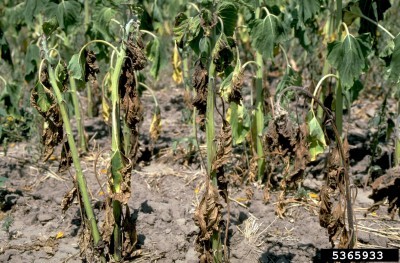






Leaves that curl, wilt, discolor and die may mean that a plant is suffering from verticillium wilt. You may first notice these symptoms in spring or fall when temperatures are mild. Read on to find out how to distinguish verticillium wilt from other plant diseases and what to do about it.
Verticillium wilt is a fungal disease that lives in the soil. It invades susceptible plants through their roots and spreads through the plant’s vascular system. The list of plants affected by verticillium wilt is extensive and includes trees, shrubs, and garden annuals and perennials. It can also affect fruit and vegetable crops.
Verticillium wilt symptoms mimic those of other plant diseases and environmental problems, and this makes it hard to diagnose. The leaves wilt and curl, and turn yellow or red. They eventually turn brown and drop off. Stems and branches die back. It’s not unusual to see these symptoms on one side of the plant while the other side appears unaffected.
As the disease travels up a tree or shrub’s vascular system, it leaves dark discolorations. If you peel back the bark, you’ll see dark streaks on the wood. If you cut through a branch and look at the cross section, you’ll see rings of dark color. These discolorations in the wood can help you tell the difference between verticillium wilt and other plant diseases.
Verticillium wilt can’t be cured once it enters the plant. It’s best to remove and destroy small, easily replaced plants. The disease remains in the soil after you remove the plant, so don’t plant another susceptible species in the same area.
Verticillium wilt treatment for trees and shrubs focuses on giving the plant the best possible care to build up its resistance. Water the plant regularly, and when possible, provide afternoon shade. Fertilize on schedule, using a low-nitrogen, high-phosphorus fertilizer. Prune off dead and dying branches.
You can often get rid of the verticillium wilt fungus in the soil by solarization. Soil solarization heats up the top 6 inches or so of soil to temperatures high enough to kill the fungus. Prepare the soil by tilling or digging and then wetting it down. Cover the area with a clear plastic tarp and bury the edges under a few inches of soil to hold it in place and keep the heat in. It takes three to five weeks of bright sunlight and warm temperatures for the soil to heat up enough to kill the fungus.
Verticillium wilt is a devastating and incurable disease, but with special care and attention, you can preserve the plant and enjoy it for several more years.
Copyright © www.100flowers.win Botanic Garden All Rights Reserved